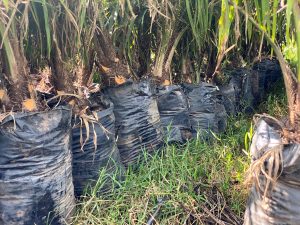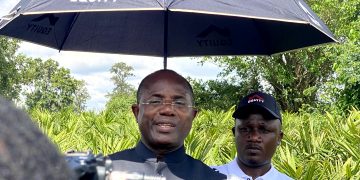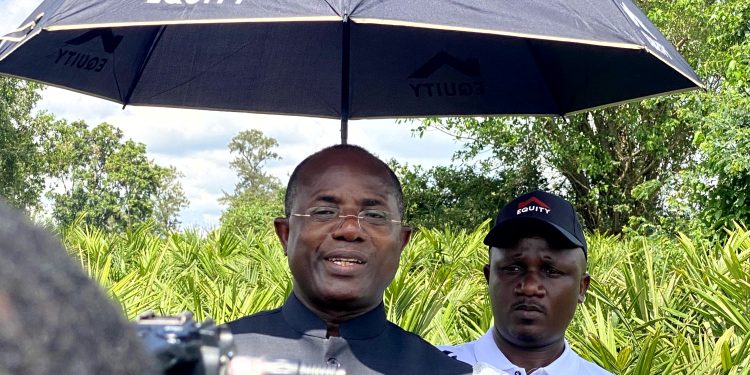Mayuge — The Government of Uganda is seeking land in Mayuge District to establish a palm oil processing mill and a nursery, as part of its plan to expand the National Oil Palm Project (NOPP) to the Busoga sub-region.
The call was made by the State Minister for Agriculture, Hon. Fred Bwino Kyakulaga, during the official launch of the oil palm planting exercise in Mayuge District this month. The Mayuge hub — which also covers Bugiri and Namayingo districts — marks the first phase of oil palm cultivation in Busoga, following years of preparation and feasibility studies.
Hon. Kyakulaga revealed that the government requires about 500 hectares of land to construct the mill and nursery, which will serve farmers across the hub.
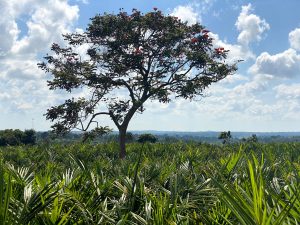
“Government currently does not own land in this area, so we are calling upon willing landowners to sell land for this purpose,” the Minister said. “The mill will allow farmers to process their harvest locally, creating jobs and ensuring long-term income for households.”
The Minister emphasised that Busoga’s proximity to Jinja offers a logistical advantage, as crude oil extracted from the mill can easily be transported to Jinja for refining.
The Mayuge oil palm initiative is part of a broader strategy to increase domestic vegetable oil production, reduce poverty, and improve household incomes through commercial agriculture. Uganda currently spends over USD 300 million annually on imported palm oil, a cost the government aims to cut significantly once local production scales up.
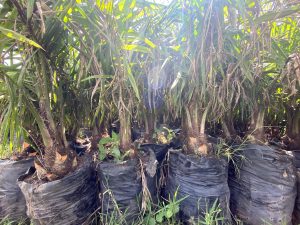
Low-Interest Financing
Equity Bank Uganda, which serves as the fund manager for the National Oil Palm Project, is partnering with the Ministry of Agriculture to manage and disburse funds to participating farmers.
Ms Catherine Psomgen, Director for Public Sector and Social Investments at Equity Bank Uganda, said the bank has already supported 896 farmers in Mayuge, Bugiri, and Namayingo with over UGX 1.2 billion in financing.
“We provide financial literacy training, agribusiness support, and ensure that funds are used transparently and efficiently. Through our Africa Resilience and Recovery Plan, we’ve dedicated 30% of our loan portfolio to agriculture.”
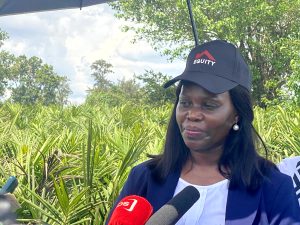
Under the scheme, smallholder farmers with 2.5 to 5 acres of land can access up to UGX 25 million at a 10% interest rate — significantly lower than market rates — with a four-year grace period and six years for repayment. The funds are released directly to suppliers for land preparation, seedlings, fertilisers, and maintenance, ensuring accountability.
Local Production and Expansion Plans
A nursery with 50,000 seedlings has already been established in Mayuge and is ready for distribution to farmers. The seedlings, previously imported from Indonesia and Malaysia, are now being produced locally through the National Agricultural Research Organisation (NARO) to reduce costs and delays.
The government is also preparing Phase Two of the project, which will expand into Bugweri, Iganga, Luuka, and Jinja districts in the next financial year.

Hon. Kyakulaga reiterated that sugarcane farming will not be replaced but complemented by oil palm, given that only 10% of Busoga’s land area is needed to meet Uganda’s annual demand for refined palm oil.
While enthusiasm for the project is high, land acquisition remains a major challenge. The Mayuge District Oil Palm Growers Cooperative Society reported that over 54,000 planting holes have already been dug, yet many farmers are still awaiting seedlings.
“We have the farmers, we have the funding, and we have the will,” Hon. Kyakulaga said. “What we now need is land for the mill and nursery so that Busoga’s oil palm dream becomes a full reality.”
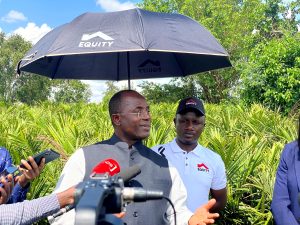
The National Oil Palm Project is funded by the International Fund for Agricultural Development (IFAD) with USD 76 million, complemented by private sector investment to a total of USD 210 million (UGX 300 billion). The program aims to empower smallholder farmers, create rural jobs, and strengthen Uganda’s agro-industrial base under the government’s Agro-Industrialisation Agenda.
